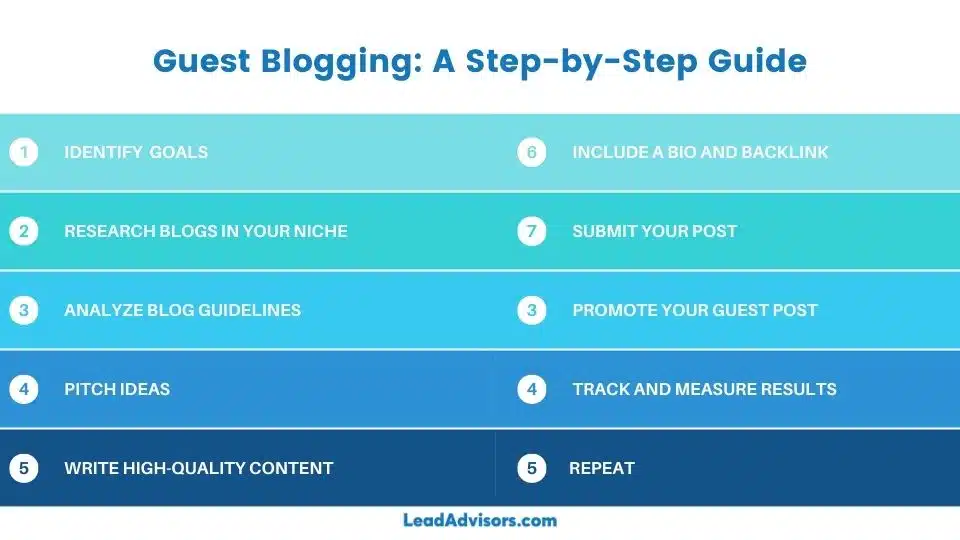Guest blogging is a powerful strategy to boost your online presence and authority. According to recent studies, blog posts generate 55% more backlinks, making guest blogging a critical component of off-page SEO. By writing for established blogs, you can drive targeted traffic, enhance your credibility, and leverage content syndication to reach wider audiences. Effective guest blog lead generation strategies can help you connect with potential customers and grow your brand. This guide will explore how to maximize the benefits of guest blogging and integrate it into your overall marketing strategy.
What Is Guest Blogging?
Guest blogging, also called guest posting, is simply writing and publishing an article on someone else’s blog or website. A combination of collaborative practices where the guest blogger writes unique and authentic content to the contributor’s website, normally in return for receiving backlinks from that site. It benefits both parties since the host site gets fresh, high-quality content, and in return, there will be a link or links to the blog back from that post. Networking, establishing credibility, and getting traffic back to the guest blogger’s website are benefits that come along with writing blog posts.
You May Also Like: Best Techniques to Execute a Strong Off-page SEO Strategy
Guest Blogging: A Step-by-Step Guide
Identify Your Guest Blogging Goals
To make your guest blogging efforts successful, start by defining your objectives. Determine whether you aim to build brand recognition, gain high-quality backlinks, boost your website’s ranking, or drive targeted traffic. Clear goals help align your efforts and measure success accurately. Establish quantifiable benchmarks to track progress towards your goals like metrics to measure ROI.
Also, set targets like publishing a specific number of guest posts monthly or achieving a certain amount of referral traffic. This organization allows you to measure success and refine your strategies. For those new to blogging, this guide can help you how to start a successful blog to provide foundational insights.
Research Blogs in Your Niche
To find suitable blogs for guest posting, search engines, social networks, and industry forums are invaluable resources. Certainly, look for blogs that discuss topics relevant to your industry and attract a similar target audience. Leverage keyword research and keyword mapping to identify blogs that rank well for industry-specific terms. Compile a list of potential blogs where your guest posts can have the highest impact.
Next, evaluate these blogs based on domain authority and readership engagement. Further, check for high-quality, relevant content and active comment sections. Selecting well-established blogs with an engaged audience will broaden your reach and enhance your credibility.
Analyze Guest Blog Guidelines
Carefully review the submission guidelines for each blog to understand the dos and don’ts of guest posts. These guidelines provide insights into the preferred content style, tone, and target audience, helping you tailor your submission accordingly. Knowing these details ensures your content aligns with the blog’s standards.
Pay attention to specifics like word count, formatting, topic limitations, and submission instructions. Generally, follow the blog’s structure, formatting styles, and relevant themes to build trust and increase acceptance chances.
Additionally, consider how you can repurpose content, incorporate short-form content, and utilize content promotion strategies. Taking care of these crucial details helps avoid your guest post requests ending up in the trash.
Pitch Guest Blog Ideas
Craft a concise and relevant email pitch introducing yourself and suggesting several topic ideas tailored to the blog’s niche. Hence, explain why these topics would be valuable for their audience, demonstrating that you have thoroughly researched their blog. Highlight your background and share samples of your work to establish credibility.
Mention any professional or personal experiences that showcase your expertise. Include links to previously published articles or your portfolio. Consider suggesting content that fits within topic clusters or pillar content, and discuss how your guest post can integrate into their content hub. Avoid duplicate content and adhere to their content calendar. Particularly, this thoughtful approach will increase the likelihood of your pitch being accepted.
Write High-Quality Content
To write high-quality content, focus on creating informative and engaging long-tail content tailored to the blog’s audience. Overall, include a detailed summary or practical points, and make your content valuable with key takeaways and actionable advice. Support your points with references, examples, or case studies from credible sources to enhance authenticity.
Adhere to the blog’s submission guidelines, including word count, structure, and tone. Ensure your content complies with the style and preferences of the blog. Incorporate various types of SEO content and SaaS content writing principles. Additionally, integrating elements of sponsored content can further enrich your submission. Following these guidelines with care demonstrates professionalism and increases the chances of your article being accepted and published.
Include a Bio and Backlink
In your guest post, include a brief bio that highlights who you are, your qualifications, and relevant experience. For example, “John Doe is an SEO and content marketing expert with over 10 years of experience. Follow him on Twitter @JohnDoe or visit his blog at www.johndoe.com.” Keep it concise and focused on your expertise.
Seamlessly integrate backlinks within the content or in your bio. Use natural anchors that lead to your blog or homepage. For instance, include a sentence like, “For more insights into social media strategies, click here.” This approach drives traffic to your site and provides additional resources for readers.
Submit Your Post
Submit your guest post through the blog’s email process or online form, ensuring that all elements (article, author bio, authenticated images/links) are included. Adhere to all guidelines to prevent delays in the review process. Allow the blog owner ample time to respond with feedback or approval, keeping in mind that editors are often very busy.
If you don’t receive a response within the specified timeframe, follow up politely to show your continued interest in collaboration. This professionalism enhances your social media branding and reinforces your visual identity as a reliable contributor.
Promote Your Guest Post
Promote your guest post across all social media platforms to expand its reach and visibility. Share the link on Twitter, LinkedIn, Facebook, and Instagram, tailoring your message to each audience. Write compelling captions and use relevant hashtags to extend your reach. Tag the blog or website hosting your content to maximize potential traffic.
Engage with comments and questions on the guest post to build relationships and establish authority. Responding to feedback and starting discussions not only improves engagement but also demonstrates your commitment to offering valuable insights. This active involvement enhances your social media marketing plan and boosts your content marketing efforts, leading to more followers and increased credibility.
Track and Measure Results
Incorporate analytics to evaluate how traffic and engagement from your guest post have increased. Tools like Google Analytics can show who arrives on your site from the guest post, how long they stay, and what actions they take. Additionally, track social media shares and comments/reactions on the host blog to gauge reader engagement.
Assess if your guest blogging met the goals you set, such as referral traffic, conversion rates, and backlinks. Analyze these metrics to determine success in increasing brand awareness or gaining high-quality backlinks. Use these insights to build a more effective social media plan and execute future guest blogging campaigns that align with your overall marketing strategy.
Read More: 8 Effective Blog Outreach Strategies for Website Authority
Advantages of Guest Blogging for Businesses
Numerous advantages of guest blogging can help improve your online presence and business development. These are some of them:
Increases Brand Visibility
Writing for well-known sites as a guest gets your brand in front of more eyes. This leads to more people recognizing your brand and potentially visiting your website.
This exposure can significantly boost your visibility and attract new visitors to your website, increasing engagement. By reaching a broader audience through reputable blogs, you enhance brand awareness and drive more traffic, leading to higher interaction and potential conversions.
Create Authority and Credibility
Writing for respected blogs is an excellent way to demonstrate your expertise in your industry. This can significantly boost your credibility, enhance your website’s authority, and improve your domain authority. By associating your content with high-authority sites, you position yourself as a trusted and knowledgeable figure in your field.
When you share your insights on these reputable platforms, it validates what you know and helps expand the trust that a disparate audience might have in your abilities. This can, in turn, lead to speaking engagements and collaborations as well as more business.
Drives Targeted Traffic and Increase Engagement
Guest blogging is an effective strategy for attracting visitors who resonate with your content, typically through links back to your site. When your guest post aligns with the host blog’s community, readers are more likely to click over to your site and engage with your offers or services.
This targeted traffic is particularly valuable as it consists of an audience already interested in your niche, leading to higher engagement and increased chances for conversions. By leveraging guest blogging, you can bring significant traffic and boost overall site interaction.
Enhances SEO
When you guest post through quality backlinks, your website will rise rapidly on search engines. The benefit of this is increased organic traffic from SEO over time.
Backlinks generated from guest blogging on reputable sites carry a certain amount of weight with search engines. Better rankings will lead to more traffic from organic search.
You May Also Like: SEO Strategy: Link Building for Pillar Content and Branded Content
Conclusion
Guest blogging is a powerful strategy for expanding your reach by placing your content in front of new audiences on established blogs. This method can accelerate your authority-building process compared to relying solely on organic methods like SEO. By appearing on well-known blogs, you increase your credibility and visibility. When done correctly, guest blogging can significantly benefit your business by driving targeted traffic and boosting engagement. Start leveraging this strategy today to amplify your online presence and grow your followers. For expert assistance in maximizing your guest blogging efforts, consider partnering with LeadAdvisors.









